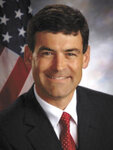MADISON, Wis. – Wisconsin Gov. Tony Evers signed a bill into law Dec. 3 aimed at increasing Wisconsin’s agricultural exports.
The bill, sponsored by Rep. Tony Kurtz, of Wonewoc, and Sen. Joan Ballweg, of Markesan, will commit $5 million to increasing Wisconsin’s agricultural export markets to the tune of 25% by June 30, 2026. Nearly half the expenditure will be focused on growing dairy export markets.
“Agriculture is without a doubt the backbone of Wisconsin,” Kurtz said. “I am excited for what the future of Wisconsin’s agricultural industry holds with increased exports. Out of a $105 billion industry, we are only exporting about 3%, just a little over $3 billion a year. There are such opportunities, but it takes people to go to those countries and build those relationships, and we need some seed money to do that.”
According to Kurtz, the bill’s roots date back to the governor’s January 2020 State of the State address, where he made a proposal that called for $1 million, focused entirely on dairy. Kurtz and Ballweg took that ball and ran with it, growing the legislation to developing the export markets of Wisconsin’s dairy, meat and crop products.
“I am ecstatic that we got this done,” Kurtz said. “Our state never actually invested in our agriculture exports before. We do a very good job of promoting our manufacturing exports but have never really promoted our ag exports.”
Kurtz said with the way the global economy is changing, Wisconsin is in a great position to begin working in earnest to capture a share of the changing markets.
“In the next 10 years, the middle class of these other countries is going to grow by a billion people, and as those people obtain a greater income, they are going to want more proteins, more cheeses, more meats,” Kurtz said. “That is where we come in with our high-quality products. I think we are in a unique opportunity.”
Kurtz said a lot of work is being done on Wisconsin’s ports, including those at Superior, Milwaukee, LaCrosse and Prairie du Chien. The improved shipping infrastructure will go hand-in-hand with developing Wisconsin’s agricultural export markets, he said.
“I know the people at (the Wisconsin Department of Agriculture, Trade and Consumer Protection) and the Wisconsin Economic Development Corporation will get this off the ground,” Kurtz said. “The big thing is that travel has to open to develop these trade missions. In 2021, there were no trade missions because of COVID.”
DATCP and WEDC are required to submit specific plans for the program by Dec. 31 and at least 15% of the program funds must be used for grants.
While the bill calls for a 25% increase by 2026, Kurtz said the Legislature will need to be somewhat flexible in reviewing the program because of the COVID-19-related travel restrictions.
“We can’t look at the five-year mark and say, ‘This was a failure,’ if we don’t reach 25% by then when the first year or year and a half we are still dealing with COVID,” Kurtz said. “We need benchmarks to know if this is working and if it is a program we should continue funding.”
Kurtz said the legislation is tied to the budget process. When the program audit is conducted, the Legislature will be moving into the next budget cycle.
“I wanted to time it with when we are working on the budget,” Kurtz said. “Then when we get the audit report, we can see that it is working and know we want to put more money into it; or we will see that it is not reaching the growth we wanted and look at what we need to do differently.”
State Senator Howard Marklein of Spring Green, represents the 17th Senate District, which he says is one of the districts the most dependent on agriculture in the state. Marklein serves as the co-chair of the Joint Finance Committee and the vice-chair of the Senate Committee on Agriculture and Tourism and has championed the bill as it made its way through the legislature.
“A 25% increase of exports is a big goal, but I think it is good to challenge ourselves,” Marklein said. “We do a great job at production, and this is not about increasing production. It is about finding new markets for what we are already producing.”
He agreed with Kurtz that there is a chance COVID-related implications might put a damper on the program reaching its full potential, but said that is something that will need to be addressed in the future.
“We cannot wait for the perfect time, or we would never do anything,” Marklein said. “I am glad we are doing this now, and we will have to deal with the challenges of COVID as they come to us.”
Dairy-related organizations have applauded the work put forth in this bill and look forward to what the legislation will do to help grow new markets for Wisconsin dairy farmers.
“The strength of Wisconsin’s dairy economy rests in large part on the opportunities we have to sell more of our high-quality products around the globe,” said Dairy Business Association President Amy Penterman, a dairy farmer from Thorp,, in a press release. “This investment will help us not only remain competitive in the global marketplace but be a leader.”
In a press release, following the signing of the bill, Evers reiterated his continued support of Wisconsin’s agricultural community and dairy industry.
“Wisconsin’s robust agricultural and agribusiness exports are not only a cornerstone of our state’s economy but our Wisconsin way of life,” Evers said. “We started this work to promote and increase Wisconsin’s product exports even before the pandemic to help support our farmers and our rural communities, and I’m proud this legislation has finally made it to my desk.”


Comments
No comments on this item Please log in to comment by clicking here